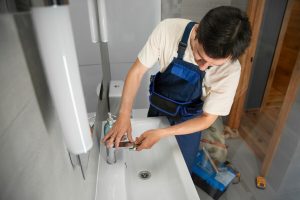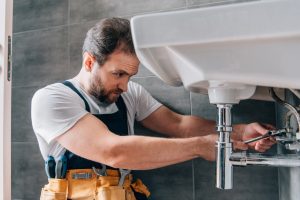
Leak Repair and Repiping
Leaking pipes are not just a nuisance; they can lead to significant water damage, mold growth, and skyrocketing utility bills if left unaddressed. In cases where leaks are recurrent or widespread, repiping may be necessary to ensure your property’s structural integrity and water efficiency. This comprehensive guide’ll delve into the importance of professional leak repair and repiping solutions, common signs of pipe damage, and how to find reputable professionals for these critical plumbing services.
Importance of Professional Leak Repair and Repiping
- Preventing Water Damage: Prompt leak repair prevents water from seeping into walls, ceilings, and floors, mitigating the risk of structural damage and mold growth.
- Preserving Water Quality: Leaks can introduce contaminants into your water supply, compromising its quality and posing health risks to occupants.
- Reducing Utility Bills: Repairing leaks and installing efficient piping systems can significantly reduce water waste and lower monthly utility bills.
- Enhancing Property Value: Well-maintained plumbing systems, including leak-free pipes and updated piping materials, contribute to the overall value and marketability of your property.
Signs You May Need Leak Repair or Repiping
- Visible Water Damage: Stains, discoloration, or warping on walls, ceilings, or floors may indicate hidden pipe leaks.
- Low Water Pressure: Decreased water pressure in faucets and fixtures can result from mineral buildup, corrosion, or pipe damage.
- Frequent Leaks: Recurring leaks in the same location or multiple leaks throughout the property suggest underlying issues with the piping system.
- Rusty or Discolored Water: Brown or rusty water coming from faucets indicates corrosion or rusting of pipes, compromising water quality.
- Strange Noises: Banging, rattling, or clanging sounds when using water fixtures may signal loose or damaged pipes in need of repair.
Professional Leak Repair Process
- Inspection: A qualified plumber conducts a thorough inspection of the plumbing system to locate and assess the extent of leaks.
- Leak Detection: Utilizing advanced techniques such as video camera inspection or leak detection devices, the plumber pinpoints the exact location of leaks.
- Repair: Depending on the type and severity of leaks, repairs may involve patching, sealing, or replacing damaged sections of pipe.
- Testing: The repaired pipes undergo pressure testing to ensure they can withstand normal water flow without leaking.
- Preventive Measures: In addition to repairing existing leaks, plumbers may recommend preventive measures such as pipe insulation or corrosion-resistant coatings to reduce the risk of future leaks.
Professional Repiping Process
- Assessment: A thorough assessment of the property’s plumbing system is conducted to determine the need for repiping and the extent of the project.
- Material Selection: The plumber helps you select the most suitable piping materials based on factors such as budget, water quality, and longevity.
- Preparation: Before repiping begins, the plumbing system is shut off, and existing pipes are drained to prevent water damage during the process.
- Installation: The old pipes are removed, and new pipes are installed according to the predetermined layout and design.
- Testing and Inspection: Once repiping is complete, the system undergoes rigorous testing and inspection to ensure proper functionality and compliance with plumbing codes.
Finding Reputable Professionals for Leak Repair and Repiping
- Credentials and Licensing: Verify that the plumber or plumbing company is licensed, insured, and bonded to perform leak repair and repiping services.
- Experience and Expertise: Look for professionals with extensive experience in leak detection, repair, and repiping, preferably with positive customer reviews and testimonials.
- Transparent Pricing: Request detailed estimates from multiple plumbers and compare their pricing, ensuring transparency and no hidden fees.
- Warranty and Guarantees: Choose a plumber who offers warranties on their workmanship and guarantees satisfaction with the completed repairs or repiping project.
- Professionalism and Communication: Opt for professionals who prioritize customer service, communicate effectively, and address any concerns or questions you may have throughout the process.
Conclusion
Professional leak repair and repiping services are essential for maintaining the integrity and efficiency of your property’s plumbing system. Whether you’re dealing with persistent leaks or outdated piping materials, investing in professional solutions ensures long-term water savings, property protection, and peace of mind. By understanding the importance of timely repairs, recognizing signs of pipe damage, and partnering with reputable professionals, you can safeguard your property against costly water damage and enjoy reliable access to clean, high-quality water for years to come.







